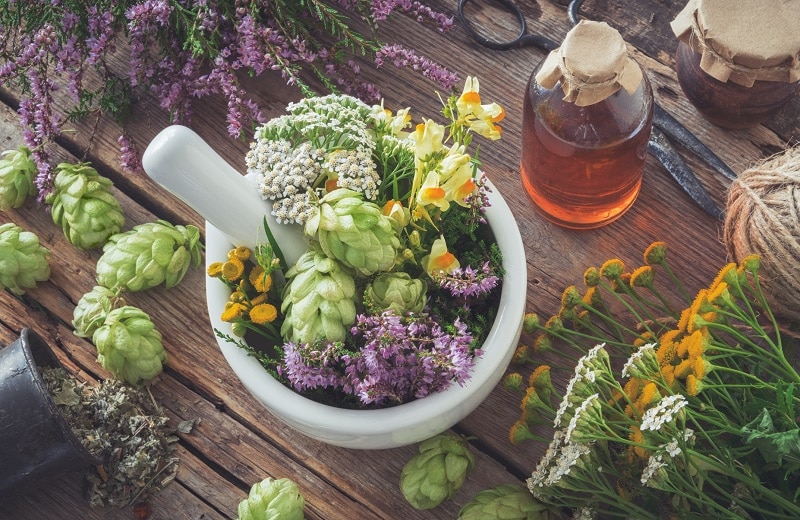Herbalism is the use of plants to promote human health. Teas, tinctures, extracts, compresses, soaks and salves are examples of herbal healing methods. Today in the U.S. and Canada, herbalism is considered an alternative medicine (alternative to conventional, allopathic methods). However, the practice of using plants for therapeutic purposes is the norm around the world, and humans have relied on plant medicine throughout history.
Herbalism is a fascinating field because it’s both natural and flexible. An herbalist can acknowledge the latest research on plant compounds right alongside using centuries-old techniques. It’s all good! Herbalists know which plants and methods can provide specific benefits, and they may also bring in plant energies, nature’s cycles, and cultural beliefs. Herbalism also encourages sustainability. We must sustain our environment so it can help sustain us in return.
What is an Herbalist?
Herbalists are plant medicine experts. In herbal traditions, leaves, seeds, bark, flowers, roots and other plant parts are carefully selected to address specific health concerns. Since these plant parts can be potent, they should be used as directed by a skilled practitioner—an herbalist. Modern herbalists are specially trained in the field of herbal medicine. While some are certified by accredited or well-established herbal schools, others are self-taught or learn herbalism through family tradition.
The training one receives is based on the type of herbalist they want to become. Home herbalists may receive training that’s more informal and structured around their family’s needs. Clinical herbalists must understand the scientific side of herbs—the current research and its applications, the chemical makeup of plants, and botanical classifications.
Training also varies by herbal traditions. For example, Indian and Chinese cultures have unique herbal medicine paradigms infused with generations of knowledge and practice. Chinese herbalists typically receive formal training to learn the therapeutic uses of Chinese herbs. Ayurvedic herbalists study remedies that balance the body’s three primary metabolic forces (doshas) known as Vata, Pitta and Kapha.
What do Herbalists Do?
“Herbalist” is an inclusive term that covers a range of backgrounds, specialties, and traditions. But regardless of their differences, there are three key things to know about herbalists.
1. Herbalists support wellness with plants
Herbalists use specific plants to support your holistic wellness and address specific conditions. They prefer herbs that have been grown organically or wild and in their native environments. This helps to ensure that no unexpected chemicals such as fertilizers or pesticides are present in the herbal formulations.
Also, herbs grow best in their native environments. Turmeric, for example, grows well in the rainy tropics where it is hot and humid. Turmeric grown in a cold, northern climate wouldn’t be as full of phytonutrients (healing compounds). So, an herbalist might seek out organic turmeric that is from India.
2. Herbalists use whole herbs in their formulas
While modern medicine may use lab-created, synthetic copies of herbal active ingredients, herbalists use actual herbs to create their remedies. In some cases, herbalists use whole herb extraction to deliver the active compounds of the plants. Depending on the plant, an herbalist might use oil, water, ethanol, or pressure to gently extract nature’s whole profile of beneficial compounds. The focus is to preserve each herb’s innate nuances and whole spectrum of compounds that could be lost or discarded if the herbs were broken apart or synthesized.
There are herbal supplement companies that take care to follow this principle, such as New Chapter. This Vermont company has a full line of pure, potent herbal formulas extracted using only gentle traditional methods or with natural carbon dioxide to capture and deliver the full profile of the whole herb—like the calming black seed (Nigella sativa) extracts in Stress Relief One Daily Multiherbal or the fatigue-fighting herbal blend in Energy Boost One Daily Multiherbal.
3. Herbalists customize formulations for your needs
Herbalists know that remedies aren’t one-size-fits-all. Instead, formulations are customized to treat your specific needs or conditions. Herbalists take a holistic approach to care—considering your physical, mental, emotional, social, spiritual, and economic needs to develop a remedy that works specifically for you.
Herbalists can play a crucial role in maintaining and restoring good health. In some areas of the world, they are the primary care doctors. In other places, they work alongside Western medical practitioners. Many types of healthcare professionals—including chiropractors, naturopathic doctors, and conventional medical practitioners—may use herbalism to treat patients in conjunction with their therapies. Because of this, herbalism is sometimes known as “complementary” medicine, which describes methods used alongside conventional medicine to holistically manage an individual’s healthcare needs.
Herbalism & You
Interested in working with an herbalist yourself? Try a quick web search to find practitioners in your area or ask at your local natural foods store. You can also benefit from supplements formulated by herbalists for your specific needs—including Zyflamend™, New Chapter’s premier herbal formula for healthy inflammation response.† Zyflamend is crafted with 10 potent botanicals from Western and Eastern herbal traditions (from rosemary and holy basil to green tea) in a clinically studied formula.† It supports joint health and function and delivers ginger for occasional pain relief (related to pain after exercise).†
Herbalism and its gifts seem likely to blossom more than ever during the 21st century. Herbalism is a practice of conscious coexistence with earth and allyship with nature—and that’s exactly what humans and the planet need more of right now.
†These statements have not been evaluated by the Food and Drug Administration. This product is not intended to diagnose, treat, cure, or prevent any disease.

